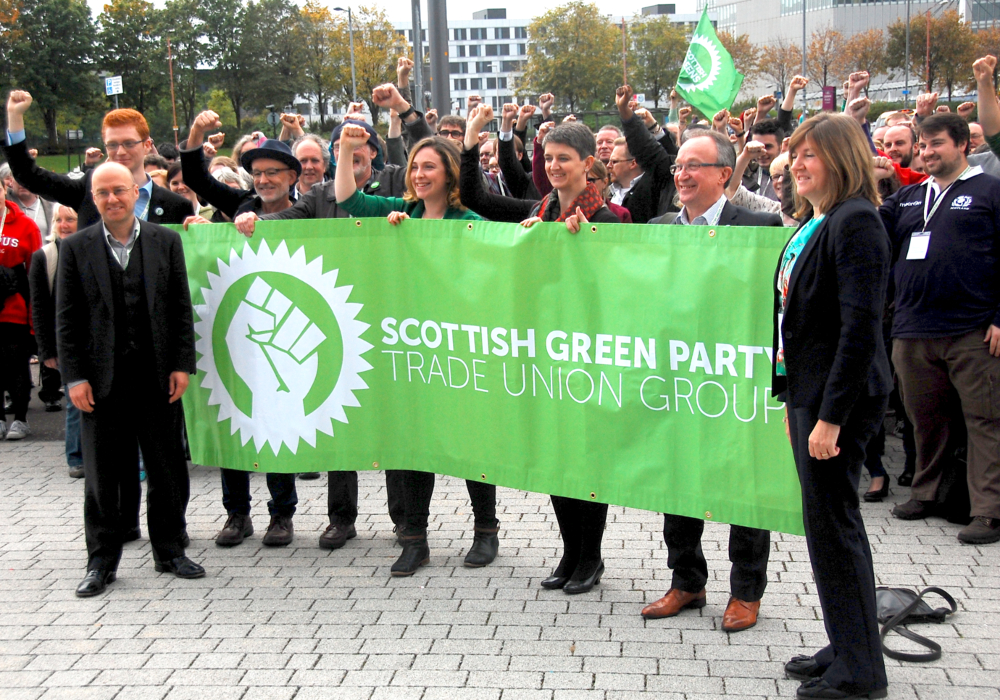Clare Bailey in Belfast: fighting for pro-choice, gay rights, and transparency

Deputy leader of the Northern Ireland Greens, a main driver in them both becoming a pro-choice party and in the resurgence of the Queer Greens, volunteer for Marie Stopes, and working for Nexus, the sexual abuse charity: it is fair to say that Clare Bailey is a driving force behind green and progressive politics in Northern Ireland.
We met for a chat over coffee in the noisy downstairs of Queen’s Students’ Union, the din in the coffee shop competing with the howl of the wind outside. We immediately slipped into comfortable conversation, Clare exuding a natural friendliness and openness, and wasted no time swapping local campaigning stories, mine from Northampton, hers from South Belfast. What became quickly apparent during our conversation was how the unique nature of Northern Irish politics offers both obstacles and opportunities for the South Belfast Greens.
Clare jokes that people are often “taken by surprise” by the Greens turning up on their doorstep, but often pleasantly so, with her stating that she has “never left a doorstep without a smile.” In a political environment that for so long has been dominated by parties determined to continually emphasise sectarian issues, a party that gets little coverage and wishes to talk about other issues can be a breath of fresh air. There are also no real ‘no-go’ areas in the constituency like there are for some of the larger parties, she explains, particularly useful in a PR system (MLA’s are elected to the Northern Ireland Assembly via a form of proportional representation) where support might come from a more diffused set of voters.
Clare describes how she will often finish speaking to someone by being rewarded with a pledge to vote for her in a local election, but not for Westminster, with the fear of ‘the other side’ getting in still too strong. Whilst many seem to be positively inclined towards the Greens, their fear of other parties can often count for more, as can their disillusionment with the political process.
Clare talks of how voter apathy can be an issue in trying to gain voters’ trust, particularly in the at times toxic atmosphere of Stormont politics. She talks of how many people, particularly young people (of which make up a sizeable portion of the electorate in South Belfast) feel that politics is quite regressive in Northern Ireland and do not view it as an avenue for positive change, rather something that keeps people trapped in a regressive past.
Another issue that any political party faces in the area is the high turnover rate of the electorate. Not only does this make it harder to establish a relationship with the electorate, it also means party members aren’t always going to be veteran campaigners in the area either.
One reason for this in South Belfast is the presence of Queen’s University and the student population that comes with it. Anyone that has canvassed even briefly in a constituency that is home to a university will know that students can be an electoral nightmare: often they are still registered for back home (or not on the register at all), international students that cannot vote, or simply disinterested in local politics, not fully identifying as ‘local residents’ due to the transitory nature of university life. Yet those students that do vote in South Belfast will be more likely to vote Green than other demographics: a chance for South Belfast Greens in amongst the challenges.
A key part of the approach the South Belfast Greens have taken is in building trust and “putting down roots”, as Clare describes it. She talks of building relationships with voters in the area, so they know who you are and what you stand for, an approach that seems to be paying off. Indeed, the South Belfast Greens obtained an impressive 5.7% of the vote in the general election earlier this year (with Clare as their candidate), more than 2% higher than the GPEW’s national average and more than 5 times the average for the Northern Ireland Green Party.
Clare believes that recent dogmatic stances by the DUP on issues such as same-sex marriage have made some voters think twice about traditional allegiances. The Greens emphasise evidence based policy over and above religious opinion or personal bias, a value that is attractive to many. Being the only party to publish donations over £500 publicly avails them well to voters too, illustrating their honest approach to politics. Such pragmatic and principled stances, along with a more nuanced view of sectarian issues (see my interview with Cllr John Barry) and investing the time and energy into building a relationship with the South Belfast community seems to be beginning to pay off.
Practical changes such as forming a new constituency group for South Belfast, bringing more members into positions of planning and leadership, and starting a ‘target to win’ strategy have increased the sophistication of the group as they move into the build up to next May’s Assembly elections. Clare is very hopeful, believing that she has a real shot at joining party leader Steven Agnew at Stormont after the next round of MLA’s are chosen.
Even on the local level, sectarianism can still frame and dominate Northern Irish politics, but the increasingly positive reception to the Green message in South Belfast shows signs of hope. The hard work and passion of Clare Bailey and the rest of the South Belfast Greens has sown the seeds for a flourishing of the green vision: hopefully its roots can spread throughout the rest of the UK soon too.



Leave a Reply